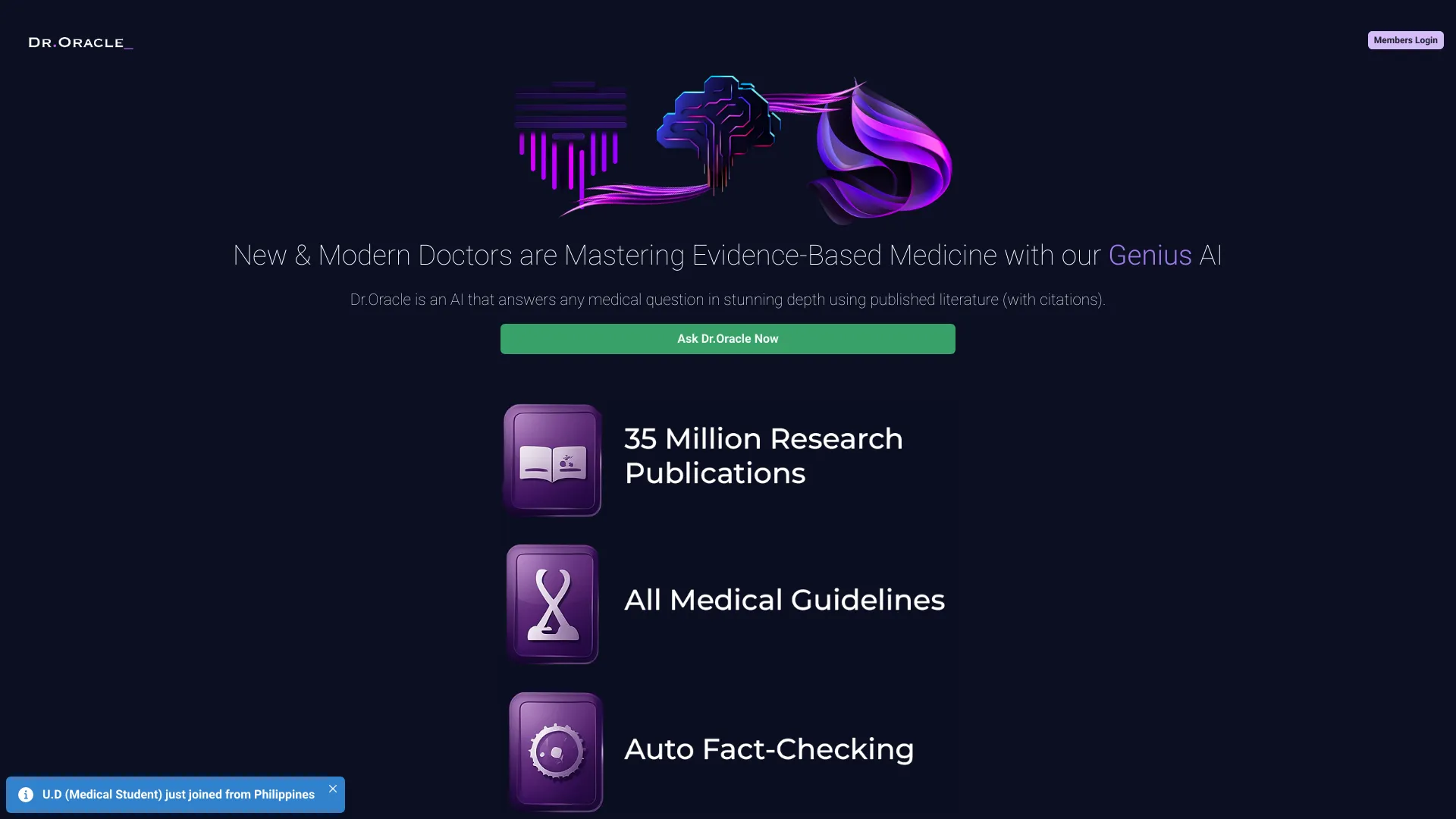- Home
- AI Healthcare
- Dr Oracle

Dr Oracle
Open Website-
Tool Introduction:Kapwing AI for teams: edit, subtitle, resize, collaborate online.
-
Inclusion Date:Oct 21, 2025
-
Social Media & Email:
Tool Information
What is Dr Oracle AI
Dr Oracle AI is a medical artificial intelligence platform that delivers instant, guideline-directed answers to complex clinical questions with clear, traceable citations. Drawing on established medical guidelines and PubMed literature, it synthesizes research into nuanced, evidence-based explanations and indicates the strength of the sources it references. Built for physicians, medical providers, and students, it reduces time spent searching, supports clinical reasoning, and improves documentation quality. Its transparent citations and evidence assessment help users quickly verify recommendations at the point of care or during study and exam preparation.
Dr Oracle AI Main Features
- Guideline-directed answers: Provides responses aligned with current clinical guidelines for consistent, evidence-based practice.
- PubMed-backed citations: Includes citations to primary literature and reviews, enabling rapid source verification.
- Evidence strength evaluation: Indicates the quality or strength of cited evidence to guide confidence in recommendations.
- Nuanced synthesis: Summarizes complex topics into clear, clinically relevant insights rather than generic summaries.
- Natural language queries: Accepts everyday clinical questions and follow-ups for efficient, conversational use.
- Multi-specialty coverage: Addresses a broad range of medical topics across common disciplines and scenarios.
- Transparent reasoning cues: Highlights key guideline statements and study findings to support critical appraisal.
Who Should Use Dr Oracle AI
Dr Oracle AI suits clinicians seeking fast, evidence-based guidance at the point of care, physicians refining management plans, and medical students consolidating knowledge with verified citations. It is also helpful for residents preparing for rounds, clinical educators building teaching materials, and healthcare teams standardizing answers to recurring clinical questions.
How to Use Dr Oracle AI
- Define your clinical question in natural language, including relevant context (e.g., age, comorbidities, setting).
- Submit the query and review the guideline-directed answer generated by the platform.
- Open the provided citations to guidelines and PubMed literature to validate key statements.
- Note the indicated strength of evidence to calibrate decision-making and documentation.
- Ask follow-up questions to clarify nuances, contraindications, or alternative options.
- Apply insights judiciously alongside clinical judgment and local policies.
Dr Oracle AI Industry Use Cases
A hospitalist consults Dr Oracle AI to align antibiotic choices with guideline recommendations and supporting trials for a complex infection. A primary care physician confirms statin intensity and monitoring intervals with cited evidence. In medical education, students use the platform to explore differential diagnoses and reference landmark studies during problem-based learning, ensuring citations are ready for presentations or notes.
Dr Oracle AI Pros and Cons
Pros:
- Delivers fast, evidence-based answers grounded in guidelines and PubMed literature.
- Includes transparent citations and indicates evidence strength for informed decisions.
- Saves research time and supports consistent clinical documentation.
- Handles natural language queries and follow-up for efficient workflows.
- Supports education with traceable sources and concise synthesis.
Cons:
- Not a substitute for clinical judgment or specialist consultation.
- Quality depends on the availability and currency of guidelines and literature.
- Guideline variations by region or institution may require local adaptation.
- Highly atypical or rare conditions may have limited coverage or weaker evidence.
- Users still need to critically appraise citations and apply context.
Dr Oracle AI FAQs
-
Question 1: Does Dr Oracle AI replace a clinician?
No. It provides information support with citations and evidence strength but does not replace clinical judgment or specialist input.
-
Question 2: What sources does it use?
It references specific medical guidelines and PubMed literature, citing sources so users can verify recommendations.
-
Question 3: How does it present evidence strength?
The platform indicates the relative strength or quality of the cited evidence to help users gauge confidence in the answer.
-
Question 4: Can it handle complex, multi-condition questions?
Yes, it synthesizes nuanced answers, but clinicians should review citations and apply context, especially in complex cases.
-
Question 5: Who is it for?
Physicians, medical providers, and students who need guideline-directed, citation-backed answers for clinical or educational use.
